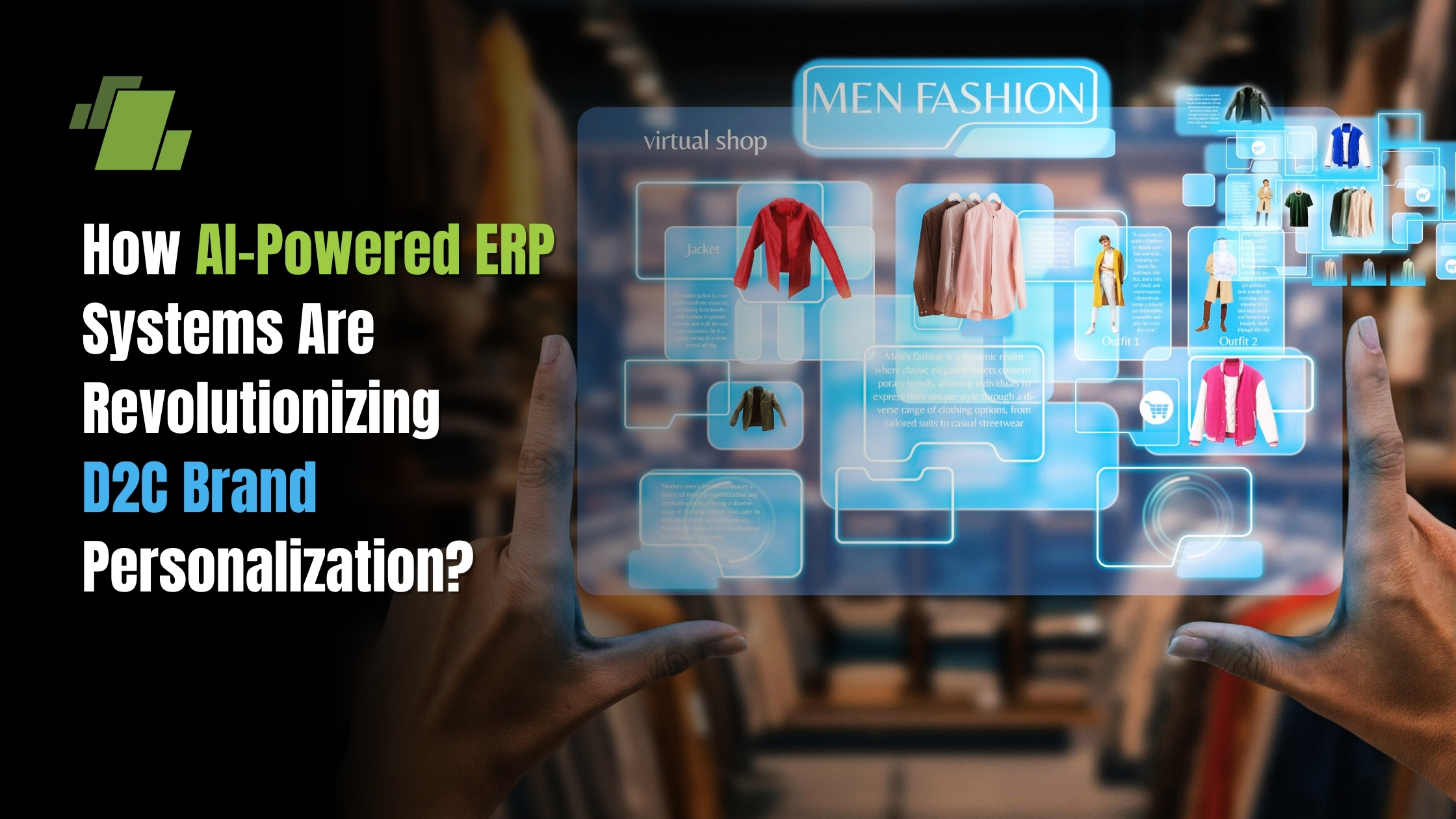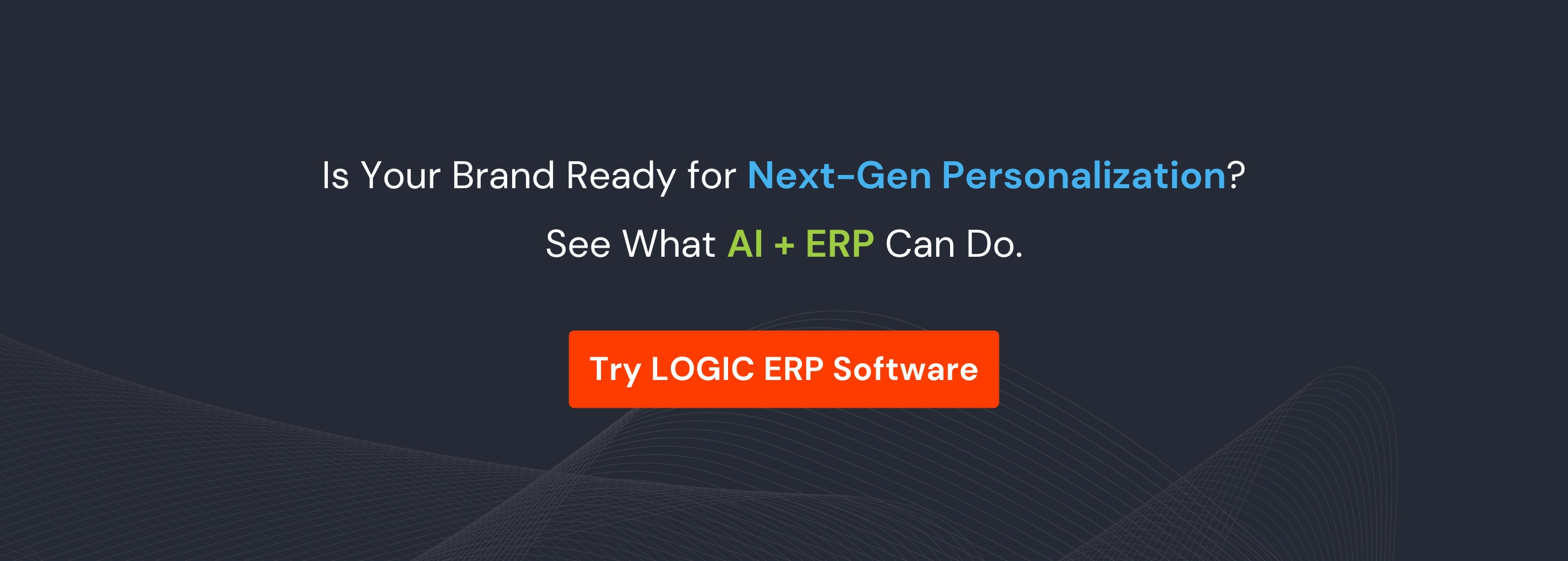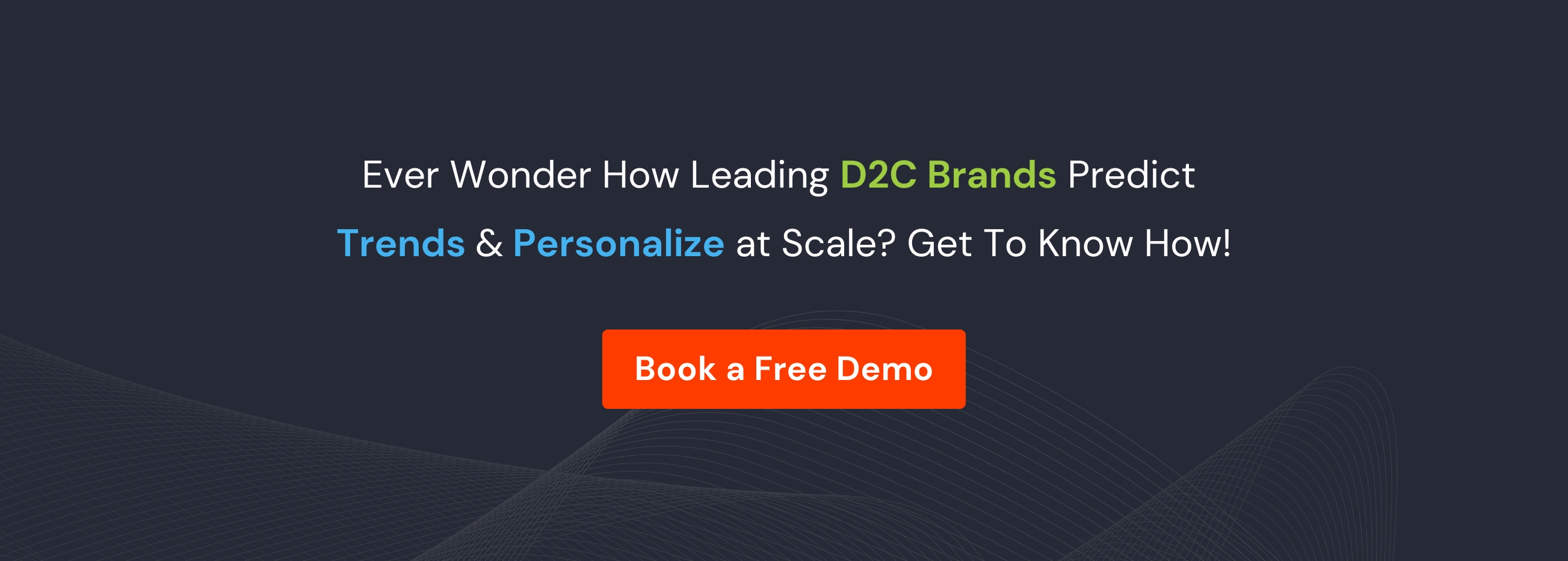How AI-Powered ERP Systems Are Revolutionizing D2C Brand Personalization?


Transform your direct-to-consumer business with AI-powered ERP solutions that deliver hyper-personalized customer experiences at scale. Book demo today!
Introduction:
The AI-Powered ERP Revolution in D2C Commerce
Direct-to-Consumer (D2C) brands are transforming the retail world, and they’re doing it with smart tech. From AI-powered personalization to eco-conscious practices, they’re not just selling products, they’re building experiences.
With the power of AI, D2C brands can understand each customer better, what they like, what they need, and even what they might want next. That means more personalized recommendations, fewer friction points, and smarter decisions at every touchpoint.
AI allows D2C brands to intimately understand each customer, create hyper-personalized experiences, reduce friction in every journey, and predict trends before they happen. When integrated with LOGIC ERP software, these capabilities transform how brands operate, from inventory management to customer engagement.
What Makes AI-Powered ERP Systems An Integral Growth Partner for D2C Brands?
The Intelligence Layer That Changes Everything
Personalization: Generative AI can customize interfaces, recommendations, or content to individual users or departments, leading to a more tailored and efficient user experience in the ERP system. This represents a fundamental shift from traditional ERP systems that treat all customers the same to intelligent platforms that adapt to individual preferences and behaviors.
Beyond Basic Automation: True Predictive Intelligence
AI-powered tools will help brands forecast customer behaviors, suggest products based on previous interactions, and even anticipate customer support inquiries. Modern AI-integrated ERP systems like LOGIC ERP don’t just process data, they learn from it, predict outcomes, and automate decision-making processes.
Key AI-Powered Personalization Features Transforming D2C Operations
1. Intelligent Customer Data Analysis and Segmentation
It analyzes data like browsing habits, purchase history, and engagement to discern individual preferences and predict needs. AI-powered ERP systems create comprehensive customer profiles by:
- Behavioral Pattern Recognition: Analyzing browsing patterns, purchase frequency, and seasonal preferences
- Predictive Customer Lifetime Value: Calculating potential customer worth to optimize marketing spend
- Dynamic Segmentation: Automatically grouping customers based on evolving behaviors and preferences
- Cross-Channel Data Integration: Unifying customer interactions across all touchpoints
2. Hyper-Personalized Product Recommendations
AI-powered capabilities such as recommendation engines, dynamic pricing strategies and personalized content delivery empower businesses to understand and anticipate customer needs, leading to more accurate and impactful personalization.
Modern ERP systems adapt AI to deliver:
- Real-time Product Suggestions: Instant recommendations based on current browsing behavior
- Contextual Recommendations: Product suggestions that consider time, season, and customer lifecycle stage
- Cross-selling and Upselling Intelligence: Strategic product combinations that increase average order value
- Inventory-Aware Recommendations: Suggestions that optimize stock levels while maximizing sales
3. Dynamic Pricing and Personalized Offers
AI can be used to analyze customer data and provide personalized recommendations, improving the overall shopping experience. It can also help optimize inventory levels by predicting demand patterns and automatically adjusting stock levels.
AI-powered pricing strategies include:
- Customer-Specific Pricing: Personalized discounts based on purchase history and price sensitivity
- Real-time Price Optimization: Dynamic pricing that responds to demand, inventory levels, and competition
- Loyalty-Based Pricing: Automatic tier-based pricing for repeat customers
- Predictive Promotional Campaigns: AI-driven offers that maximize conversion probability
4. Intelligent Inventory Management for Personalization
Better demand forecasting: Generative models, by accurately predicting product or service demands enable D2C brands to:
- Personalized Stock Allocation: Distribute inventory based on regional and customer preferences
- Predictive Restocking: Anticipate demand for personalized product variations
- Size and Color Optimization: Stock management based on individual customer preferences
- Seasonal Personalization Planning: Prepare inventory for personalized seasonal campaigns
How Does LOGIC ERP Enable Advanced D2C Personalization ?
Integrated D2C Solutions with AI Capabilities
Whether you’re just starting or scaling up, LOGIC ERP helps D2C brands like yours stay organized, reduce costs, and make smarter moves across retail, distribution, and manufacturing. LOGIC ERP provides D2C brands with:
Omnichannel Personalization Management
- Unified customer profiles across all sales channels
- Consistent personalized experiences from online to offline
- Real-time inventory synchronization for personalized product availability
- Integrated customer service with personalization context
Advanced Analytics and Business Intelligence
- Customer behavior analytics and predictive modeling
- Personalization performance tracking and ROI measurement
- A/B testing capabilities for personalization strategies
- Real-time dashboards showing personalization effectiveness
Real-World Success: SNITCH Case Study
LOGIC ERP omnichannel retail software implementation at SNITCH, streamlining their D2C and B2C brand with advanced solutions demonstrates how AI-powered ERP systems transform D2C operations:
- Unified Customer Experience: Seamless personalization across all customer touchpoints
- Intelligent Inventory Management: AI-driven stock optimization based on customer preferences
- Automated Personalization Workflows: Reduced manual effort while increasing personalization effectiveness
- Scalable Growth Support: Infrastructure that grows with increasing personalization demands
The Scalability Advantage of AI-Powered ERP Systems
Managing Growing Personalization Demands
The scalability of AI and machine learning is also important. They manage growing interaction volumes without quality loss, ensuring that as a D2C business expands, its personalization efforts remain effective and impactful.
Key Scalability Benefits:
- Automated Personalization at Scale: Handle thousands of individual customer journeys simultaneously
- Performance Optimization: Maintain personalization quality as customer base grows
- Resource Efficiency: Minimize human resources required for personalization management
- Global Expansion Support: Adapt personalization strategies for different markets and cultures
Cost-Effective Personalization Implementation
ERP is the key to automating and optimizing all the work. AI-powered ERP systems provide:
- Reduced Operational Costs: Automation eliminates manual personalization tasks
- Improved ROI: Better targeting increases conversion rates and customer lifetime value
- Efficient Resource Allocation: AI optimizes marketing spend and inventory investment
- Faster Time-to-Market: Rapid deployment of personalized campaigns and product launches
Implementation Strategy: Getting Started with AI-Powered ERP Personalization
Phase 1: Foundation Building (Months 1-3)
Data Integration and Preparation
- Consolidate customer data from all touchpoints
- Implement data quality management processes
- Establish AI-ready data architecture
- Set up personalization measurement frameworks
Basic AI Features Activation
- Enable automated customer segmentation
- Implement basic recommendation engines
- Set up predictive analytics dashboards
- Configure personalized email campaigns
Phase 2: Advanced Personalization (Months 4-8)
Dynamic Content and Pricing
- Deploy real-time personalization algorithms
- Implement dynamic pricing strategies
- Launch personalized product catalogs
- Activate behavioral trigger campaigns
Cross-Channel Integration
- Unify personalization across all channels
- Implement omnichannel customer journeys
- Enable consistent personalized experiences
- Optimize cross-channel attribution
Phase 3: AI-Powered Optimization (Months 9-12)
Predictive Personalization
- Deploy advanced forecasting models
- Implement proactive customer service
- Launch predictive product development
- Enable autonomous personalization optimization
Continuous Learning and Improvement
- Implement AI model refinement processes
- Deploy advanced A/B testing frameworks
- Enable real-time personalization optimization
- Establish continuous performance monitoring
Measuring Success: KPIs for AI-Powered Personalization
Customer Experience Metrics
Personalization Effectiveness Indicators:
- Customer Satisfaction Score (CSAT) improvement
- Net Promoter Score (NPS) increases
- Customer effort score reductions
- Personalization engagement rates
Behavioral Impact Measurements:
- Session duration and page depth increases
- Bounce rate reductions
- Return visitor frequency improvements
- Customer journey completion rates
Business Performance Indicators
Revenue Impact Metrics:
- Average order value increases
- Conversion rate improvements
- Customer lifetime value growth
- Revenue per visitor enhancements
Operational Efficiency Gains:
- Inventory turnover improvements
- Marketing spend efficiency
- Customer service cost reductions
- Process automation savings
Overcoming Common Implementation Challenges
Data Quality and Integration Issues
Challenge: Inconsistent or incomplete customer data across systems
Solution: Implement robust data governance processes and use AI-powered data cleansing tools integrated within your ERP system
Privacy and Compliance Concerns
Challenge: Balancing personalization with privacy regulations
Solution: Build privacy-by-design principles into AI algorithms and maintain transparent data usage policies
Technology Adoption Barriers
Challenge: Team resistance to AI-powered systems
Solution: Provide comprehensive training and demonstrate clear ROI benefits to gain buy-in
Scalability Planning
Challenge: Ensuring personalization systems can handle business growth
Solution: Partner with scalable ERP providers like LOGIC ERP that offer cloud-based infrastructure and flexible pricing models
Future Trends: What’s Next for AI-Powered ERP Personalization
Emerging Technologies Integration
Advanced reasoning capabilities, capable of multistep problem-solving and nuanced analysis, became common across most of the platforms. The future of AI-powered ERP systems includes:
Multimodal AI Capabilities
- Voice-activated personalization commands
- Visual AI for product recommendation enhancement
- Video content personalization
- Augmented reality integration
Advanced Predictive Intelligence
- Emotion-based personalization
- Predictive customer service needs
- Autonomous inventory optimization
- Self-optimizing marketing campaigns
Industry-Specific Personalization Evolution
Fashion and Apparel Trends:
- AI-powered style prediction and trend forecasting
- Personalized size recommendations using body scanning
- Virtual styling and outfit coordination
- Sustainable fashion recommendations
Beauty and Cosmetics Innovation:
- Skin analysis and personalized product formulation
- Virtual try-on experiences
- Ingredient compatibility analysis
- Seasonal beauty routine optimization
Getting Started: Your AI-Powered ERP Personalization Roadmap
Step 1: Assessment and Planning
Evaluate Current Capabilities
- Audit existing customer data and systems
- Assess current personalization efforts
- Identify key improvement opportunities
- Define success metrics and goals
Choose the Right ERP Partner i.e. LOGIC ERP that offer:
- Proven D2C industry experience
- Scalable cloud-based architecture
- Comprehensive AI integration capabilities
- Strong support and training programs
Step 2: Implementation Planning
Create a Detailed Implementation Timeline
- Set realistic milestones and deliverables
- Allocate resources and budget appropriately
- Plan for training and change management
- Establish success measurement frameworks
Prepare Your Organization
- Train team members on AI-powered personalization concepts
- Establish data governance policies
- Create cross-functional implementation teams
- Develop customer communication strategies
Step 3: Launch and Optimization
Execute Phased Rollout
- Start with low-risk personalization features
- Gradually expand AI capabilities
- Monitor performance and gather feedback
- Continuously optimize based on results
Measure and Refine
- Track key performance indicators daily
- Conduct regular system performance reviews
- Implement continuous improvement processes
- Stay updated on emerging AI technologies
Conclusion: The Future is Personalized, Intelligent, and Scalable
The cloud, personalization, AI and mobile are major ERP trends shaping this software. The integration of artificial intelligence with ERP systems represents a fundamental shift in how D2C brands can compete and thrive in the modern marketplace.
With AI predicting customer needs and interests, brands can preemptively reach out to offer support and deepen loyalty before customers even encounter any issues. This proactive approach to personalization, enabled by intelligent ERP systems, creates competitive advantages that are difficult to replicate.
The brands that invest in AI-powered ERP personalization today will be the market leaders of tomorrow. With LOGIC ERP providing the foundation for intelligent, scalable personalization, D2C brands of all sizes can access enterprise-level capabilities that were previously available only to large corporations.
The question isn’t whether AI-powered personalization will become standard in D2C commerce, it’s whether your brand will be among the early adopters who gain the competitive advantages, or among the followers who struggle to catch up.
Ready to revolutionize your D2C brand with AI-powered ERP personalization? Contact LOGIC ERP to discover how AI-powered personalization can transform your D2C brand’s growth trajectory today!
Call us at +91-7341141176 or send us an email at sales@logicerp.com to book a free demo today!



